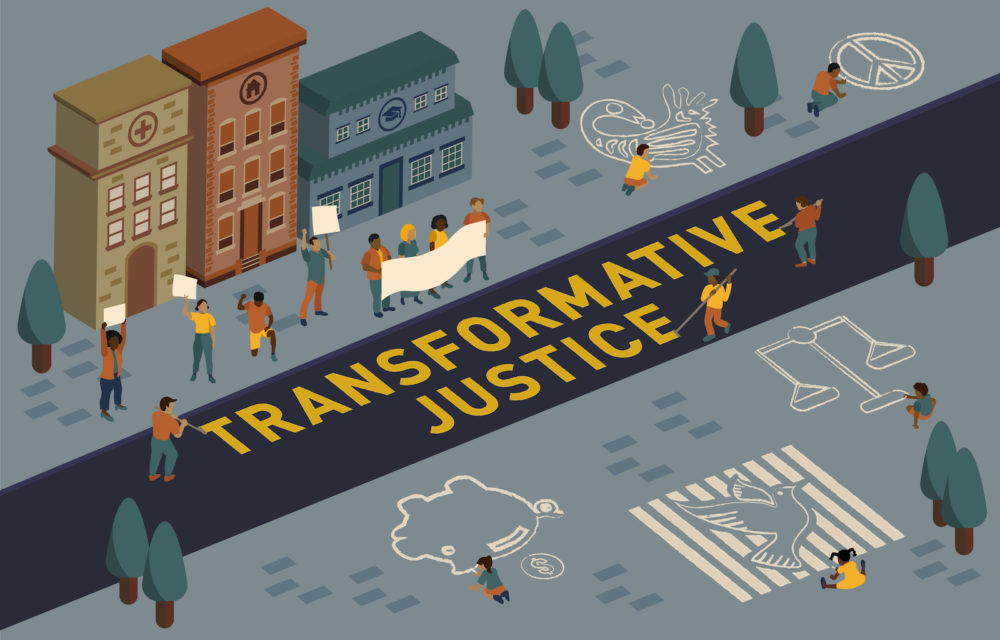
The Bellarmine College of Liberal Arts, along with a host of campus and community partners, calls upon the Loyola Marymount University community to join the work of Building Transformative Justice Where We Stand as part of this year’s Bellarmine Forum, an annual celebration of the life of the mind in relation to LMU’s mission and heritage.
For communities grappling with violence, crime, and high imprisonment rates, Transformative Justice offers a different way of thinking about crime and our response to it. The Forum critiques our current model of remedying injustice and explores how Transformative Justice might offer new and better solutions that address harm and accountability, as well as healing for the survivor and aggressor.
“Transformative Justice seeks to repair harm in communities without creating additional harm. This includes understanding the current sociopolitical structures of ‘justice’ including prisons, jails, and DCFS while acknowledging the trauma that the institutions themselves can cause to individuals, families and communities,” explains Deanna Cooke, Bellarmine Forum co-director, director of BCLA Engaged Learning, and clinical assistant professor of psychology. “There is a strong correlation between race, poverty and incarceration, so Transformative Justice also acknowledges that poverty and racism are root causes of harm as well. [I believe] Transformative Justice seeks to build systems that help communities live with dignity and allows community members to hold perpetrators of harm accountable for both their harm and for restoring themselves and their community after the harm.”
Accordingly, this year’s Bellarmine Forum will include a host of remote offerings to help participants better understand Transformative Justice and its application. Students are also engaging with the theme in a cluster of interdisciplinary theology, political science, psychology and communication studies courses. The Forum will span both fall and spring semesters, offering different opportunities to engage in critical dialogue, reflective practice, and organize toward deeper engagement with each other.
The forum’s fall signature event, the Justice on Trial Film Festival, will be hosted in partnership with A New Way of Life. Now in its eight year, the festival will run Sep. 17-21 and features award-winning films that “speak to the challenges encountered by people caught up in the justice system.” Tickets for remote viewing are free and more information can be found on the festival website here.
In addition to the Justice on Trial Film Festival, other key events will be Women Organizing for Justice Opportunity (WOJO) on Oct. 19, which “brings together formerly incarcerated women to sharpen their leadership skills and to use their power to strengthen the movement for social justice.” During the Justice LA event on Nov. 9, panelists will expound on the organization’s mission “to shrink the footprint of incarceration by halting jail expansion and redirecting county budget dollars towards community-based systems of care,” and answer questions from attendees.
Additionally, the CSJ Center for Reconciliation and Justice will host the Justice and Spirituality on Screen Series. The Series’ first screening, V for Vendetta, is scheduled for Sep. 8. Other co-sponsored events are being added throughout the fall, and the additional programming will continue into the Spring semester.
The theme of the forum has proved especially timely. It was selected prior to 2020 in response to the US incarceration rate. US prisoners make up 2.3 million of the roughly 11 million people incarcerated across the world. And while no one anticipated a pandemic that would have devastating effects on our prison and jail populations or nationwide demonstrations against systematic racism, the pandemic has made the stark public health disparities that characterize the United States even more clear. Nonetheless, Cooke suggests the Forum can “support [the] conversation [started by Black Lives Matter] by helping students visualize and then work to manifest a more just and equitable society.”
So how might attendees manifest this kind of justice and equity? According to Andrew Dilts, Bellarmine Forum co-director and associate professor of political science: “Transformative Justice is something that many (if not most) of us already know something about. It is what we practice when we notice a friend or a family member about to do something which might hurt themselves or others: we intervene directly to keep that from happening, keeping not only ourselves and others in mind, but the person who we are concerned about as well.” The problem says Dilts is that “we aren’t as good at this when we think about people we aren’t already connected to.”
The work co-directors Deanna Cooke and Andrew Dilts hope to accomplish with the Forum is to get people thinking about how to care for people outside of our immediate communities. In doing so, they hope LMU will begin to consider ways it too can practice Transformative Justice beyond its campus. “This is a key question that we will explore,” explains Cooke. “I look forward to what our LMU community can envision as its role in the broader society.”



